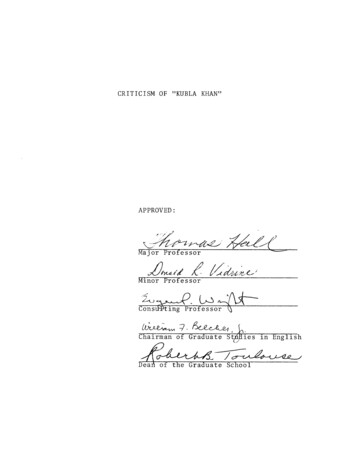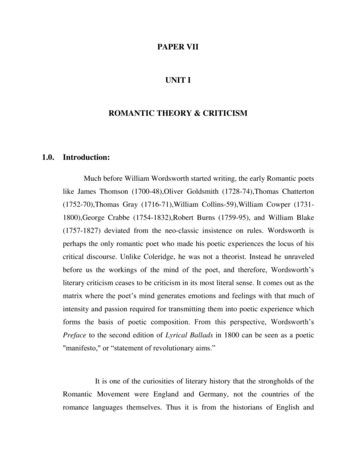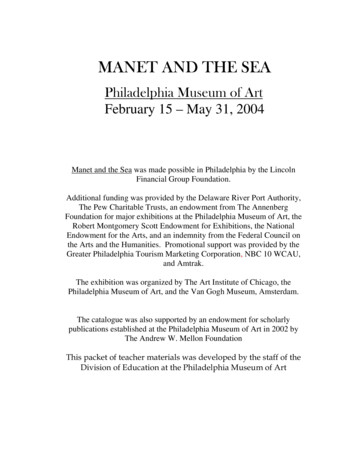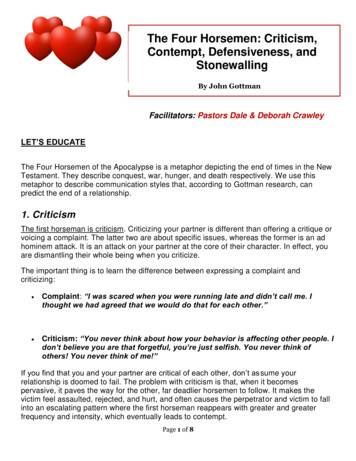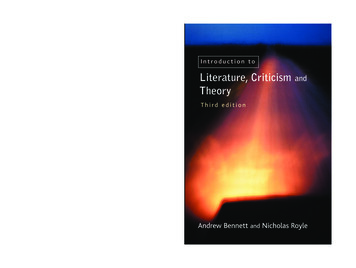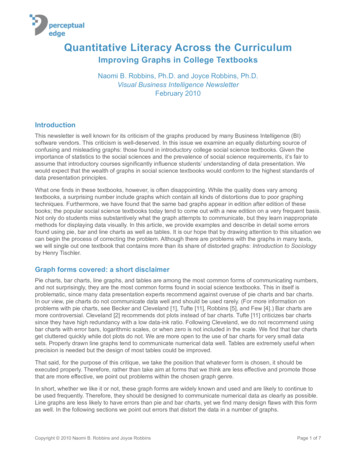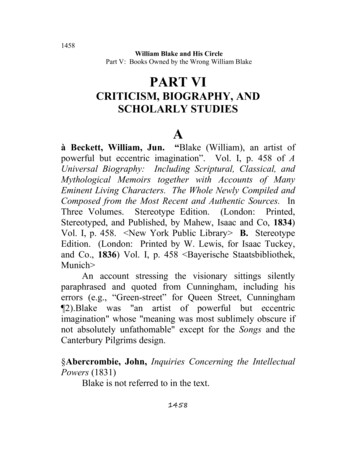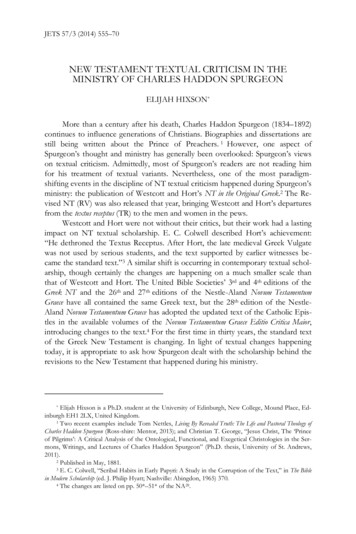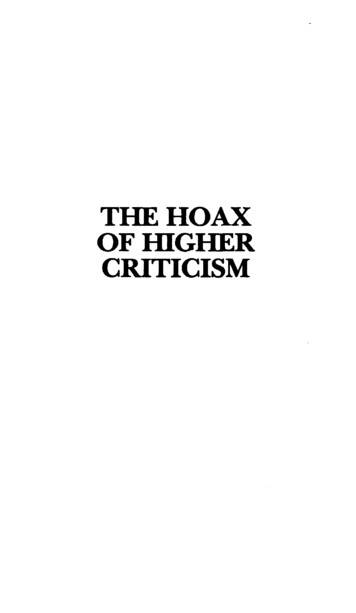
Transcription
THE HOAXOFlllGHERCRITICISM
Other books by Gary NorthMarx's Religion qf Revolution, 1968 [1988]An Introduction to Christian Economics, 1973Unconditional Surrender, 1981SuccessfUL Investing in an Age qf Envy, 1981The Dominion Covenant: Genesis, 1982Government By Emergency, 1983The Last Train Out, 1983Backward, Christian Soldiers?, 198475 Bible Questions Your Instructors PrayYou Won't Ask, 1984Coined Freedom: Gold in the Age qf the Bureaucrats, 1984Moses and Pharaoh: Dominion Religion f'ersusPower Religion, 1985Negatrends, 1985The Sinai Strategy, 1986Conspiracy: A Biblical View, 1986Unholy Spirits: Occultism and New Age Humanism, 1986Honest Money, 1986Fighting Chance, 1986 [with Arthur Robinson]Dominion and Common Grace, 1987Inherit the Earth, 1987The Pirate Economy, 1987Liberating Planet Earth, 1987Healer qf the Nations, 1987Is the World Running Down?, 1988Puritan Economic Experiments, 1988Political Polytheism: The Myth ofPluralism, 1989Tools qf Dominion: The Case Laws qf Exodus, 1989
IVTHE HOAX OF HIGHER CRITICISMTrespassing for Dear Life, 1989When justice Is Aborted, 1989The judeo-Christian Tradition, 1989Pollution: A Biblical View, 1990Slavery: A Biblical View, 1990Victim Rights: A Biblical View, 1990Books edited by Gary NorthFoundations rif Christian Scholarship, 1976Tactics rif Christian Resistance, 1983The Theology rif Christian Resistance, 1983Editor, joumal rif Christian Reconstruction ( 1974-1981 )
THE HOAXOFIllGHERCRITICISMGary NorthInstitute for Christian EconomicsTyler, Texas
Copyright 1989 by Gary NorthAll rights reserved. No part of this publication maybe reproduced, stored in a retrieval system, ortransmitted in any form or by any means, except forbrief quotations in critical reviews or articles, withoutthe prior, written permission of the publisher.Published by the Institute for Christian EconomicsPost Office Box 8000, Tyler, Texas 75711.TYpesetting by Nhung Pham NguyenPrinted in the United States of AmericaISBN 0-930464-30-3
TABLE OF CONTENTSIntroduction. . . . . . . . . . . . . . . . . . . . . I1. The Origin of Higher Criticism. .92. The Techniques of Higher Criticism. . . 213. The Ethics of Higher Criticism. . . . . . 37Conclusion. . . .49Bibliography. . . . . . . . . . . . . . . 53Scripture Index. . . . . . . . . . . . . 57Index. . . . . . . . . . . . . . . . . .59About the Author. . . . . . . . . . . .63Vll
INTRODUCTIONI have given them thy word; and the world hathhated them, because they are not of the world, even as Iam not of the world. I pray not that thou shouldest takethem out of the world, but that thou shouldest keep themfrom the evil. They are not of the world, even as I amnot of the world. Sanctify them through thy truth: thyword is truth (John 17:14-17).Jesus' words were and are clear: without God'sWord, His people cannot be sanctified - set apartfrom the world ethically, that is, clearly distinguishedfrom this perishing world of sin. God sanctifies peopleby His Word. He makes saints of them. He gives themaccess to His sanctuary in prayer and worship. AndHe does this through His Word.The Bible, all sixty-six books of the Old and NewTestaments, is the revealed and written Word of God.I t is the only visible manifestation of perfection inman's midst. It is the only unchangeable Word inhistory. It is the one and only completely reliable
2THE HOAX OF HIGHER CRITICISMsource of ethics and law in history. It is the only written document which is on the one hand unchangingand in need of no revisions, yet which is also fullyapplicable to man and his environment throughouthistory. It is fixed, yet it applies to a world of historical change. I t is, to use the language of philosophy,the "concrete universal."Beware the SeducersMost Christians have heard the New Testamentverse, "All scripture is given by inspiration of God,and is profitable for doctrine, for reproof, for correction, for instruction in righteousness" (II Tim. 3: 16).They may not remember the context of this verse,however. "But evil men and seducers shall wax worseand worse, deceiving, and being deceived. But continue thou in the things which thou hast learned andhast been assured of, knowing of whom thou hastlearned them; And that from a child thou hast knownthe holy scriptures, which are able to make thee wiseunto salvation through faith which is in Christ]esus"(II Tim. 3:13-15).Evil men continue to wax worse and worse overtime, and they continue to .deceive and be deceived.What is the antidote to their escalating evil? To continue steadfast in the things we have learned in theholy scriptures.Evil men, not being stupid, have done whateverthey could to discourage people's use of the holy scrip-
Introduction3tures. These strategies have included such things asI) de-emphasizing the use of the Bible in worship andprayer and substituting church traditions and handbooks; 2) proclaiming newer revelations that supposedly are the updated Word of God; and 3) suppressing the production and sale of Bibles. Another effective strategy has been the development of a traditionof critical scholarship that seeks to prove that the Bible is not what it says it is, namely, the revealed Wordof God. Instead, scholars present it as a disjointedcollection of misleading documents, deliberately revised and rewritten by "redactors" and editors yearsor even centuries later than the texts initially appearto have been written. The Bible, in short, is a hoax.Having made their case, they then adopt the language of praise, telling readers that, while mythical,the Bible is nevertheless a majestic document thatdeserves an important place in the varied and complex history of man's religions. In short, as hoaxes go,the Bible is a good one, as good or better than all theother hoaxes in man's religious history. This is theofficial "Party line" taken by every secular universityin its comparative religion and "Bible as literature"courses, and also in most theological seminaries.For over a century, such beliefs regarding the origin of the Bible have been common in academic circles. More important, the same beliefs have been increasingly prominent in evangelical Christian circles.And wherever such an attitude has taken root in evan-
4THE HOAX OF HIGHER CRITICISMgelical churches, colleges, and seminaries, it has led,step by step, first to theological liberalism and thento political liberalism. Why? Because once the Bibleis abandoned as the only source of unrevised and unrevisable stability in a world of ceaseless change, thereis no other reliable rock for men to stand on. In thewords of James, "he that wavereth is like a wave ofthe sea driven with the wind and tossed" Games 1:6).Men are tossed to and fro by the winds of opinion.In the twentieth century, the winds of opinion in theWest have been liberal: inherently skeptical, doubtfilled, relativistic, and existentialist, challenged onlyby dogmatic Communism, which is now itself in theprocess of self-destructing ideologically and perhapseven institutionally.Relativism cannot sustain a civilization, let alonereconstruct one. Thus, we are clearly at the end of anera, an era that began in the West over three centuries ago with the rise of Enlightenment skepticism.One of the marks of that self-conscious religious movement has been its commitment to the rejection of theBible as the inspired and authoritative Word of God.Beginning in the late seventeenth century, Socinianism (a precursor of Unitarianism) and Deism steadilyreplaced Trinitarian Christianity in the thinking ofthe intellectual and political leaders of the West, beginning most importantly with Isaac Newton (whoat least took seriously the Bible's historical texts),l1. Isaac Newton, The Chrorwlogyof the Ancient Kingdoms Amended
Introduction5and moving in ever-more openly heretical steps in theeighteenth century to Diderot, Rousseau, and Voltairein Europe, as well as Hume and the Marquis de Sade,and in North America, to such figures as Franklin,John Adams, and Jefferson. Uefferson actually produced his own highly expurgated Bible.)2At this critical juncture in man's history, in a worldnow unified technologically and economically by theinstitutions of the West, the West is losing its nerve,just as Greece did over twenty centuries ago, and imperial Rome did seventeen centuries ago. The question today is: What will replace the Enlightenmentbased West? A secondary question also needs to bedealt with: What will this transition cost?The Illusion of SecurityWhat we do know is that "you can't replace something with nothing." Thus, more than ever before inman's history, the whole world needs to be challengedby Elijah's question: "How long halt ye between twoopinions? if the LORD be God, follow him: but if Baal,then follow him. And the people answered him not aword" (I Kings 18:21). The more things change, themore they stay the same. The silence of the people led(1725). See Frank Manuel, Isaac Newton Historian (Cambridge, Massachusetts: Harvard University Press, 1963).2. The Life and Morals ofJesus of Nazareth Extracted textually from theGospels. Reprinted as An American Christian Bible Extracted by ThomasJefferson (Rochester, Washington: Sovereign Press, 1982).
6THE HOAX OF HIGHER CRITICISMto the fire coming from heaven to destroy the sacrifice. Today, we face another kind offire from the sky:man-made. We could become the sacrifice.If Christians believe that they can escape theirresponsibility to publicly ask this question of ultimatesovereignty, and also escape the effects of the world'sreply to this crucial question, they are living in a fantasy world. Many millions of fundamentalists havebeen living in just such a world. 3 But the world willnot allow them to live in illusionary safety much longer.If Christians lack confidence in the integrity anduniversal applicability of the Bible, Old and New Testaments, then they will not be able effectively to askElijah's public question. Men must be given an opportunity to decide self-consciously on their answer.There are now over five billion people alive today.Without saving faith in Jesus Christ, the vast majority of them will spend eternity in the lake of fire (Rev.20: 14). To save them, the Holy Spirit needs to makeHis move very soon. But if His own people continueto have doubts about God's Word, what will resultfrom a worldwide revival? A much greater skepticismand a far greater sense of betrayal.Thus, Christians need to regain their faith in God'sWord. An important step in the recovery of such confidence is the acknowledgment, especially in the shat3. Dave Hunt, Whatever Happened to Heaven? (Eugene, Oregon:Harvest House, 1988).
Introduction7tered seats of Christian learning, that higher criticismis a hoax.
1THE ORIGIN OFHIGHER CRITICISMFor had ye believed Moses, ye would have believedme, for he wrote of me. But ifye believe not his writings, how shallye believe my words? (John 5:46-47).So Jesus said to the Jewish leaders of His day indefense of His ministry and His person. They did notbelieve Him. Neither do their spiritual heirs today.But it is not just Jews who refuse to take thesewords seriously; it is also the vast majority of thosewho graduate from theological seminaries today. Withfew exceptions, seminaries are staffed by professorsof literature rather than professors of Christ. Theyhave adopted a view of the Bible which says that thebiblical texts reveal gross errors on the part of theBible's writers and editors. The critics refer to theBible as a myth-filled book. These classroom skepticsand their intellectual predecessors have labored for9
10THE HOAX OF HIGHER CRITICISMover a century to remove Christians' confidence Inthe accuracy of the Bible. Their personal goal, aboveall other goals, is to escape the final judgment of theGod who has revealed Himself clearly. They comfortthemselves while discomforting their Bible-believingstudents with this syllogism: "No permanent Bible,no permanent law; no permanent law, no permanentjudgment." But this absence of God's judgment mustalso be asserted with respect to history; higher criticism of the Bible plays a role in this dogma, too.There is little doubt that the successful assaulton Christianity in the late-nineteenth century camefrom two sources: Darwinism and higher criticism ofthe Bible. The latter was exported primarily from German universities. The Christian West has been underguerilla attack by German scholarship for about twocenturies. Prussians invented the government-supported kindergarten and the Ph.D. degree, two of themost insidious inventions of the modern world. (I havelong appreciated the observation by literary criticEdmund Wilson regarding the absurdity of the oppressive Ph.D. system. The world would be far betteroff today "if, at the time of the First World War, whenwe were renaming our hamburgers Salisbury Steakand our sauerkraut Liberty Cabbage, we had decidedto scrap it as a German atrocity."))I. Edmund Wilson, The Fruits if the MLA (New York: New YorkReview Book, 1968), p. 20. The MLA is the Modem Language Association.
The Origin qf Higher Criticism11Academic higher criticism of the Bible was nourished in its maturity in the same European comer ofthe academic world. It was promoted most successfully by intellectually disciplined German scholars inthe nineteenth century. These men were dedicated tothe destruction of orthodox Christianity. Their primary goal was to discover defects in the existing textsof Scripture, as well as to discover internal inconsistencies in the Bible's overall message. This strategywas designed to discredit the Christian world's faithin a permanent standard ofrighteousness. Higher criticism was the spiritual legacy of the Enlightenment,as one of its spiritual heirs frankly admits: "The rationalist Enlightenment radicalized the claim of reason and history; as a result it placed the claims ofreligion outside the realm of reason. In this divisionOrthodox theology lost its foundations in history. Thecleft between reason and history triumphed amongthe learned - including theologians - and removedthe basis of orthodoxy's epistemology."2A War for English CivilizationWhat is not generally recognized, however, is thatbiblical higher criticism had its origin in the Englishspeaking world. It was English Deism rather thanGerman scholarship that laid the intellectual founda2. Edgar Krentz, The Historical-Critical Metlwd (Philadelphia: Fortress Press, [1975] 1977), p. 21.
12THE HOAX OF HIGHER CRITICISMtion of modem higher criticism. Even before Deism,certain aspects of the critical attack on the Bible, especially the Old Testament, had begun with Renaissance humanism. 3 R. K. Harrison traces back to midseventeenth-century rationalist political philosopherThomas Hobbes the idea that the Pentateuch wascompiled from much earlier sources written by Moses. 4Edgar Krentz is an enthusiastic defender of highercriticism against what he describes as the dogmaticchurch's "fear of change, fear of losing the basis forcertainty of faith, and fear of posing questions in thearea of authority."5 He, too, identifies English Deismas the source of this intellectual development. "Theeighteenth-century Deists treated the Bible with freedom when it did not, in their lights, accord with reason. For example, they argued that Isaiah was composite, the Gospels contradictory, and the apostlesoften unreliable."6The Deists' attack on the divine authority of theBible was not simply a product of the scholar's dustystudy. It was closely associated with warring socialand intellectual movements of the day. James Barr's3. A little-known and unfortunately neglected study of the history of higher criticism is Henning Graf Reventlow, The Authority rifthe Bible and the Rise rif the Modem World (Philadelphia: Fortress Press,[1980] 1984), Pt. I.4. Roland Kenneth Harrison, Introduction to the Old Testament(Grand Rapids, Michigan: Eerdmans, [1969] 1974), pp. 9-10.5. Krentz, op. cit., p. 15.6. Ibid., p. 16.
The Origin ofHigher Criticism13observations are very important in understanding theroots of higher criticism and also in understandingthe revival of biblical literalism as a social force in theUnited States, especially after 1960. The link betweensocial action and biblical hermeneutics has beenmissed by most historians. Barr, following Reventlow's lead, does not make this mistake:Church and state formed a single continuum, and politicaland theological questions were seen as interdependent. Questions about power and legitimacy rested in a high degreeupon exegetical and interpretative ideas. In this the OldTestament - Reventlow's own specialism - was of primaryimportance. Even if the New Testament was the documentof the earliest Christianity, the way in which the other collection of books form a yet older age, the Old Testament,was related to it. For it was the Old Testament, as it seemed,that offered guidance about king and state, about a commonwealth organized under divine statutes, about law andproperty, about war, about ritual and ceremony, aboutpriesthood, continuity and succession. All of this was adisputed area from the Reformation onwards: because thesewere controversial matters in church and state, they generated deep differences in biblical interpretation. It was precisely because the Bible was assumed on all hands to beauthoritative that it stimulated new notions about its ownnature. It was because men sought answers to problemsoflife and society, as well as of thought and belief, that theBible stimulated 'critical' modes of understanding itself. 77. James Barr, "Foreword," Reventlow, Autlwrity qf the Bible, p.xiii.
14THE HOAX OF HIGHER CRITICISMProfessor David Brion Davis' insights into the effects ofDeism on Christian faith in Britain in the eighteenth and nineteenth centuries are also very important. He points out that the arguments of a handfulof unpopular Deists in the early 1700's against thevalidity of the Old Testament called forth philosophical and theological defenses from orthodox Christians.But these defenses gave away too much to the hatersof Christianity. Those Christians in our day who woulddisparage the laws of the Old Testament should takevery seriously the implicit warning in Davis' observations:By the l730s Christian apologists had learned that disputes over textual details could never drain the deepeningpools of doubt. As a compromise, it was sufficient to insiston the centrality of the resurrection and the historical fulfillment of Old Testament prophecy. As [Leslie] Stephensums up the pragmatic resolution, Englishmen could stillbelieve everything in the Bible, "but nothing too vigourously"; if the book was not flawless, it was "true enoughfor practical purposes."So far as slavery is concerned, the Deists pointed toward the future position of [Thomas] Paine and Garrison.Thus God, by definition, was good and just. Yet the Godof the Bible had authorized slavery as a divine punishment, along with such barbarities as the stoning to deathof stubborn children who refused to obey their parents. Itfollowed that the Bible could not be God's word. 88. David Brion Davis, The Problemof Slaveryin the Ageof Revolu-
The Origin of Higher Criticism15The heart of English Deism's attack on Christianorthodoxy was its faith in Newtonian natural law andhostility to Old Testament law and Old Testamentprophecy. "If one could write off the Old Testamentas testimony to a pre-Christian religion and vindicatethe New Testament in another way (e.g. through itsaccord with the law of nature) Christianity could stillbe defended, albeit as a pedagogical means to themoral illumination of mankind."g Once the denial ofthe indissoluble unity of the Bible became common,the next step was easy: the denial of the need for aninfallible New Testament in Christianity.Reventlow has provided evidence of the politicalaspects of the war for and against the infallibility ofthe Bible. He provides over 400 pages of text and 200pages of endnotes to demonstrate, among relatedthemes, that "the political thought of the sixteenth,seventeenth and eighteenth centuries continuallysought its models and arguments within the Bible,and the approach of each particular thinker in question provided the real criterion for the analogies drawnbetween the reconstructed biblical model and the principles which were normative for shaping the societyof his time." 10 The Deists launched their war on thelion, 1770-1823 (Ithaca, New York: Cornell University Press, 1975),p.528.9. Reventlow, op. cit., p. 398.10. Ibid., p. 413.
16THE HOAX OF HIGHER CRITICISMOld Testament in an attempt to substitute naturallaw for biblical law. Anyone who fails to understandthe ethical nature of this intellectual conflict does notunderstand the history ofbiblical higher criticism. Theattack on the Old Testament was a fundamental aspect of the coming of modern humanist civilization.Only as a result of the attack by Deists on the authority of Scripture (preparations for which were made, againsttheir own intentions, by Latitudinarians, Locke and Newton), an attack which they made step by step, did the legacy of antiquity in the form of natural law and Stoicthought, which since the late Middle Ages had formed thecommon basis for thought despite all the changes of theological and philosophical direction, remain the one undisputed criterion. This produced a basically new stage bothin the history of ideas and in the English constitution. Thisposition already contains the roots of its own failure, inthat the consistent development of the epistemological principles of Locke and Berkely [sic] by H ume soon showedthat its basic presuppositions were untenable. However,two irreversible and definitive developments remained,which had made an appearance with it: the Bible lost itssignificance for philosophical thought and for the theoretical foundations of political ideals, and ethical rationalism(with a new foundation in Kant's critique) proved to beone of the forces shaping the modern period, which onlynow can really be said to have begun. IIReventlow has pointed out that higher criticism11. Ibid., pp. 413-14.
The Origin ofHigher Criticism17has faded in importance since the end of the SecondWorld War. In the immediate post-war era, biblicalcriticism was an important aspect of Protestant colleges and seminaries. No longer. "Given a predominant concern with the present and its seemingly urgent practical problems, which claim almost exclusiveattention," he writes, "historical criticism and exegesishave come to take very much a back place."12Burying the DeadWhy, then, should I devote a book to this topic?Because of a parallel process: while modern humanism has visibly begun to fragment, taking with it modern liberal theology, there has been a recovery of interest within the evangelical world of real-worldquestions that are best summarized under the generalheading, "Christian worldview." The implicit dualismsof modern fundamentalism - Old Testament vs. NewTestament, law vs. grace, letter vs. spirit, church vs.state, Israel vs. the church, eternity vs. history, heartvs. mind, dominion vs. rapture, culture vs. kingdom - have begun to be either discarded or at leastseriously criticized from within the camp.13 The Chris12. Ibid., p. 1.13. On the Israel-church dichotomy, see William E. Bell, A Critical Evaluation of the Pretribulation Rapture Doctrine in ChristianEschatology (Ph.D dissertation, New York University, 1968). Seealso John F. MacArthur, The Gospel According to Jesus (Grand Rapids,Michigan: Zondervan Academie, 1988). This book sold over 100,000
18THE HOAX OF HIGHER CRITICISMtian world's recovery of a vision of ethical unity, of acomprehensive world-and-life view, is basic to any workable strategy ofChristian reconstruction. In this intellectual and emotional process ofrecovering Christianity'slost unity of vision, we are required to return to theoriginal source of the problem: men's loss of faith inthe unity of God's Word.There is an old political slogan, "You can't beatsomething with nothing." Throughout the twentiethcentury, the Christian world has found itself in theposition ofbattling something - self-confident humanism - with nothing: a philosophy of ethical dualism,a kind of Christian gnosticism. 14 This was obvious toeveryone after the Scopes' "monkey" trial of 1925. 15(In the early church, this dualistic philosophy whichpitted the Old Testament against the New Testamentwas correctly identified by the church as heretical:Marcionism.) But the roles are now being reversed.Ever since the assassination of John F. Kennedy inNovember of 1963, Western humanism has steadilylost both its vision and its "can-do" confidence. 16 Acopies in hardback within a year of its publication. The survival ofthe older dualism is best represented by Dave Hunt, Whatever Happened to Heaven? (Eugene, Oregon: Harvest House, 1988).14. Douglas W. Frank, Less Than Conquerors: How Evangelicals Entered the Twentieth Century (Grand Rapids, Michigan: Eerdmans, 1986).15. George Marsden, fundamentalism and American Culture: The Shaping qf Twentieth-Century Evangelicalism, 1870-1925 (New York: OxfordUniversity Press, 1980), ch. 10: "The Great Reversal."16. Gary North, Unholy Spirits: Occultism and New Age Humanism
The Origin qf Higher Criticism19similar loss of confidence also appeared in the mid1980's behind the Iron and Bamboo Curtains. Theimplicit and inescapable dualism of all post-Kantianthought - fact vs. meaning, science vs. ethics, phenomenal vs. noumenal l7 - became a growing intellec-tual problem after the 1880's, and it could not, likeHumpty Dumpty, be put back together again. 18 Thesocial and political effects of this accelerating intellectual disorientation became clear to most social observers after 1963. Meanwhile, the appearance ofVanTil's presuppositional apologetics in the mid-1940's, 19the revival of biblical creationism after 1960,20 andthe preliminary recovery of the Puritan vision of theearthly victory of God's Kingdom have combined toproduce a new intellectual perspective: Christian reconstruction.Basic to this reversal has been the recovery ofconfidence by Christians in the reliability of the wholeBible. They have been presented with a growing body(Ft. Worth, Texas: Dominion Press, 1986), Introduction.17. Richard Kroner, Kant's Weltanschauung (Chicago: Universityof Chicago Press, [1914] 1956).18. H. Stuart Hughes, Consciousness and Society: The Reorientation 0/European Social Thought, 1890-1930 (New York: Knopf, 1958).19. Cornelius Van Til, The New Modernism: An Appraisal if the Theology 0/ Barth and Bmnner (Philadelphia: Presbyterian & Reformed,1946).20. Henry M. Morris and John C. Whitcomb, Jr., The GenesisFlood: The Biblical Record and Its Scientific Implications (Philadelphia:Presbyterian & Reformed, 1961).
20THE HOAX OF HIGHER CRITICISMof evidence that Darwinism is a hoax. It is time forthem to recognize that biblical higher criticism is aneven older hoax, though related philosophically to DarWInIsm.
2THE TECHNIQUES OFHIGHER CRITICISMFor we have not flllowed cunningly devised ftbles,when we made known unto you the power and comingof our Lord Jesus Christ, but were eyewitnesses of hismajesty (II Pet. 1:16)."Lower criticism" is the technical literary exercise ofdetermining which ofthe existent ancient manuscripts of the Bible are authoritative and therefore "belong in the canon of Scripture. Higher criticism, using similar techniques of analysis, and going mad inthe process, argues that nothing in the canon of theBible is what it appears to be, that the Creator Goddid not directly or uniquely inspire any of it, and thatthe scribes who assembled its component parts centuries after the fact were pathetic louts who were unableto follow the logic of any argument, or keep namesstraight for three consecutive pages, or even imitate21
22THE HOAX OF HIGHER CRITICISMthe style of the previous lout who first made up someimaginary story and included it in an earlier manuscript. All of these "discoveries" are reached by meansof supposedly precise literary techniques.These textual critics regard the Bible as a kind ofnovel, so they apply to the study of the Bible techniques that are used in the literary criticism offiction.Let me cite Wilson's comments on the absurdity ofthese techniques when applied to novels, let alone theBible. He refers to an edition of Hawthorne's MarbleFaun, edited by the University of Virginia's specialistin Elizabethan bibliography, Fredson Bowers. He doesnot spare Mr. Bowers.But the fourth volume of the Centenary Edition of the worksof Nathaniel Hawthorne, which contains only The MarbleFaun, is the masterpiece of MLA bad bookmaking. I haveweighed it, and it weighs nine pounds. It is 9 x 6 1/8 inches,and 23/8 inches thick. . . . The Marble Faun, since it ismainly Mr. Bowers's work, embodies the spirit of Mr. Bowers as no other of these volumes does. Gfits 610 pages, the467 of Hawthorne are weighed down by 89 pages of "Textual Introduction" and 143 pages of "Textual Notes." Thereare 44 pages of historical introduction preceding the textual introduction. We are told in these introductions, inaccordance with the MLA formula, that, in the course ofwriting the book, the author, as novelists often do, changedthe names of certain of the characters; and that many ofthe descriptions in it - as has been noted, also a commonpractice - have been taken from his Italian notebooks. This
The Techniquesof Higher Criticism23information is of no interest whatever. Nor is it of any interest to be told that Hawthorne's wife corrected certaininaccuracies in the Roman descriptions and otherwise madeoccasional suggestions, which Hawthorne did not alwaysaccept. It has evidently been trying for Mr. Bowers to findthat, in the original manuscript, the author had been soinconsiderate as usually to make his changes "by wipingout with a finger while the ink was sti
IV THE HOAX OF HIGHER CRITICISM Trespassing for Dear Life, 1989 When justice Is Aborted, 1989 The judeo-ChristianTradition, 1989 Pollution: A Biblical View, 1990 Slavery: A Biblical View, 1990 Victim Rights: A Biblical View, 1990 Books edited by Gary North Foundations rif Christian Scholarship, 1976 Tactics rif Christian Resistance, 1983
